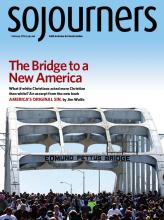PAYDAY AND CAR-TITLE loans are marketed as a quick fix to help struggling families through a financial emergency. Advertised as “EZ Cash” and “24-7 Finance,” the perils of payday loans, with exorbitant interest rates upward of 300 percent, trap households in long-term debt.
The Christian witness on lending encompasses both a prohibition against exploiting the poor with excessive interest as well as a call to steward God-given financial resources. The launch of a diverse Faith for Just Lending coalition in May challenging predatory payday lending, recent state campaigns seeking to cap the rate on payday loans, and the Consumer Financial Protection Bureau’s announcement to establish rules for payday, car-title, and high-cost installment loans all signal important public steps toward the first goal: stopping unscrupulous businesses from preying on those who are poor.
Now we must examine how to steward a financial environment where responsible lending will flourish. Many of the same groups who have opposed predatory lending are now addressing how to offer credit that empowers their neighbors rather than preys upon them. In Minnesota, Exodus Lending extends low-interest loans to help individuals pay off their payday loans. In Louisiana, the Church for the Highlands partnered with other churches and a local credit union to pay off loans when the borrower cannot. (So far, no one in the program has defaulted.) Catholic Charities of Northern Kansas hosts a loan repayment pool and invites clients into a peer mentoring relationship for financial counseling.
While churches and congregations offer a uniquely relational and holistic form of lending, other institutions can also play an important role. In Mississippi, the New Roots Credit Partnership helps employers offer low-cost loans through their payroll system. Texas’ Community Loan Center of the Rio Grande Valley offers a similar program. Employer-based programs can offer a scale and an infrastructure that keep costs down.
Some have proposed converting the U.S. Postal Service into a postal bank to provide access to simple financial services, prepaid card services, and responsible small-dollar loans. Advocates see it as a “public option” for financial services built on the existing USPS physical infrastructure and repository of public trust, though it’s an option that ultimately relies on partnership with traditional banks.
Banks and credit unions will continue to be critical players in the large-scale financial services market. They are also the ones largely to blame for gaps that exist in the small-dollar credit market. Rather than finding ways to help customers manage their cash flow and build up savings, banks lie in wait, benefitting when customers trip up. Many banks and credit unions maximize their income through carefully designed overdraft programs, which account for about 60 percent of bank fee revenue. These banks assess $35 overdraft fees each time someone overdraws an account, essentially providing a high-cost form of credit that can cost households hundreds of dollars per year. For low-income households, especially those with uneven income and work hours, this amounts to one more poverty penalty.
Read the Full Article

